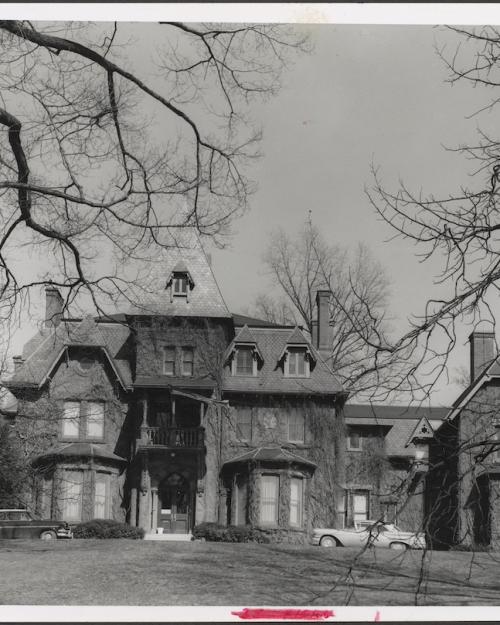Fifty years ago, Cornell’s Society for the Humanities moved into the Andrew Dickson White House, home of Cornell’s first president. To honor the anniversary, the Society has produced a booklet chronicling the history of the A.D. White House as president’s home, art museum and locus for the humanities at Cornell: “The Andrew Dickson White House: Home of the Society for the Humanities since 1973.”
In sharing the history of the house, the Society pays homage to the enduring vision Andrew Dickson White created for Cornell University and recognizes the role of the humanities in that vision.
“The booklet not only provides a wonderful, pictural overview of the history of the house, but also shows how A. D. White’s founding philosophy is so prescient for today. We are so proud of this project and the enduring relation between the arts, humanities and the A. D. White House,” said Paul Fleming, the Taylor Family Director of the Society for the Humanities and L. Sanford and Jo Mills Reis Professor of Humanities in the Department of German Studies in the College of Arts and Sciences (A&S).
The booklet traces the use of the A.D. White House over its 150-year lifespan and gives visitors an introduction to the past tenants. With an emphasis on photos, including those dating back to A.D. White’s years of residence in the house, the booklet answers frequent visitors’ questions regarding A.D. White and the Society for the Humanities. The booklet is available at the A.D. White House, 121 Presidents Drive, for visitors to browse through or pick up a copy.
A.D. White commissioned construction of the gothic mansion on the hill in 1871, at the center of what would grow to be a sprawling campus. His family moved into the house in 1874, where he lived until his death in 1918. Two more University presidents followed as residents of the Victorian mansion, before the Andrew Dickson White Museum of Art opened its doors in 1953. The art collections were relocated in 1973 to the new Herbert F. Johnson Museum of Art while the fate of the A.D. White House was debated.
Demolition was considered, but Henry Guerlac, Goldwin Smith Professor of the History of Science and Director of the Society for the Humanities (A&S) from 1970-77, fought for the preservation of the home. He applied for and received its inclusion on the National Register of Historic Places, and under his leadership, he gathered contributions for the house’s restoration and the acquisition of furnishings. The Society was moved into the house in 1973 and has cared for the building and its intellectual life ever since.
Over the years, the Society's presence at Cornell has fostered multidisciplinary dialogue and theoretical reflection on the humanities at large in multiple ways, including lecture series on the digital humanities and the future of the humanities. The Society brings together a cohort of distinguished visiting fellows, Cornell faculty, and graduate student fellows each year to pursue research on a rotating interdisciplinary focal theme; the 2024-25 theme is “Silence.” Fellows take part in seminars and experimental, innovative courses that fuel a rich environment for research and learning.
Cornell faculty and graduate students in the humanities also benefit from the numerous internal grants, workshops, and funding opportunities sponsored by the Society. Annually, the Society supports over 100 lectures, workshops, colloquia and conferences organized by humanities faculty, many of which are hosted at the A.D. White House.
What was once A.D. White’s library is now called the Guerlac Room, a space which regularly houses the lectures and conferences, so often hosted by humanities departments. The ornate dining room (which is not original to the home but installed during the tenure of the art museum) and the adjoining conservatory are highly sought after as a unique location for receptions on campus.
Upstairs, former bedrooms were turned into offices, which now house the Society’s staff and the yearly cohort of Fellows. Classes are held in the building too, and every semester students are able to learn within the same walls where A.D. White once spent countless hours on his own academic pursuits.
Archival research for this project was conducted in large part by Aidan Goldberg ’25, as part of the Humanities Scholars Program, which is housed in the Society for the Humanities. Information garnered from Goldberg’s research, institutional knowledge from within the Society, and existing House histories were compiled by Julie McLean, Society for the Humanities program manager, with assistance from Chloe Wray, event and administrative coordinator, and Kina Viola, outgoing program coordinator at the Society for the Humanities. Fleming oversaw the project.
“A pivotal moment for me in this project was finding a photograph of an upstairs bedroom, and recognizing by the roofline and windows that it was (what is now) my office,” said McLean. “Being able to administer our humanities courses and programming from this building, which is fundamental to the university, is a privilege and I hope that students and members of the Cornell community at large read this booklet to better understand A.D. White’s history and his connection to the humanities.”
Chloe Wray is the event and administrative coordinator for the Society for the Humanities.




